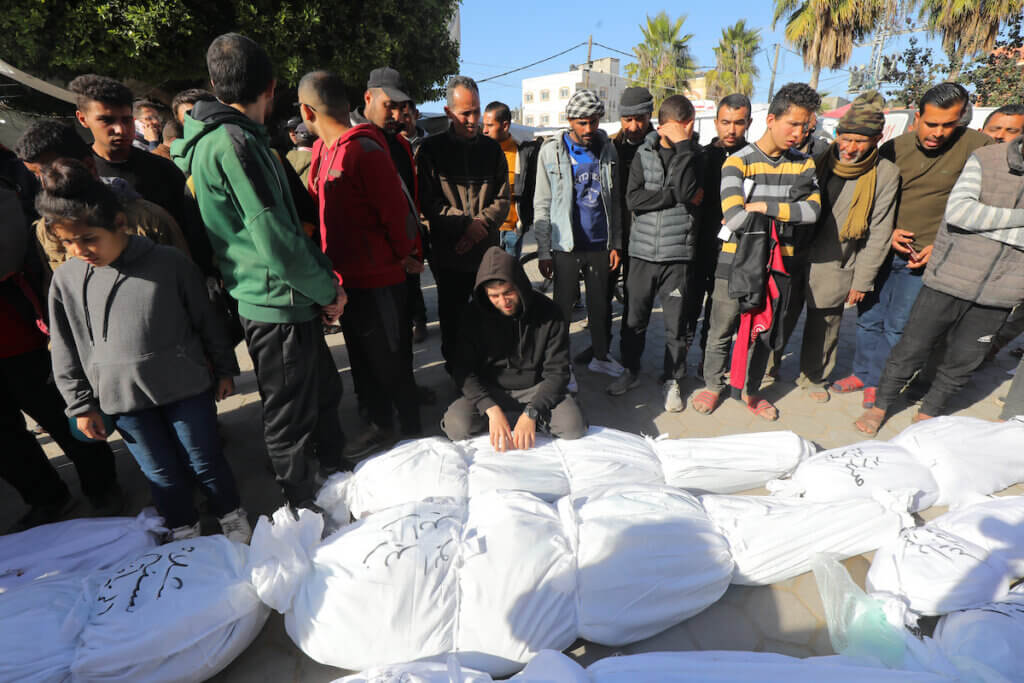‘Operation Al-Aqsa Flood’ Day 133: Israel cuts electricity to critical Nasser Hospital patients, forces staff to evacuate

Casualties:
- 28,775+ Palestinians have been killed in Gaza, including at least 12,000 children, and 68,552+ Palestinians have been injured.
- 394+ Palestinians killed in the occupied West Bank and East Jerusalem
- Israel revises its estimated October 7 death toll down from 1,400 to 1,147.
- 569 Israeli soldiers have been killed since October 7, and at least 3,221 injured.**
*This figure was confirmed by Gaza’s Ministry of Health on Telegram channel. Some rights groups put the death toll number at more than 36,500when accounting for those presumed dead.
** This figure is released by the Israeli military, showing the soldiers whose names “were allowed to be published.”
Key Developments:
- A dire situation at the Nasser Hospital in Khan Younis is unfolding, as Israel’s raid continues, forcing displaced people and medical staff to evacuate the building.
- World Health Organization (WHO) is trying to access Nasser Hospital to deliver humanitarian aid
- UNWRA: 84 percent of healthcare facilities in Gaza affected by Israeli aggression
- Satellite imagery shows the construction of a wall along the border between Gaza and Egypt, raising suspicion that Palestinians might be forced to evacuate into the Sinai Desert
- Gaza Media Office: 130 journalists killed in Gaza since October 7, 2023
- West Bank: Israeli military raids 15 homes in the town of Silat ad-Dhahr
- At least two dead in “suspected terror” shooting attack in southern Israel
- Lebanon submits a formal complaint to the UN Security Council, following Israel’s attacks in Nabatiyeh
- Russia invites Hamas and other Palestinian factions to Moscow for “inter-Palestinian” talks on Gaza, and other Middle East issues
- Germany approves the deployment of armed forces in an EU mission to thwart Houthi attacks in the Red Sea
- Biden administration meets with Jewish and Muslim community leaders to discuss rising antisemitism and Islamophobia
Dire situation unfolds at Nasser Hospital in Khan Younis
A dire situation at the Nasser Hospital in Khan Younis is unfolding as Israel continues its raid on the largest functioning medical facility remaining in the Gaza Strip.
“We are forced to transfer all the patients and the wounded to the hospital’s old building,” Dr. Nahed Abu Taima, the Director of the Nasser Medical Complex told Al Jazeera.
“Electric power was cut off from the entire medical complex,” he continued, describing how the raid is impacting the 450 patients at the hospital, many of whom are in critical condition. “Many patients in ICUs and those on oxygen supply, and also those on dialysis are left fighting for their lives.”
Meanwhile, most medical staff has been forced to evacuate—including the Medicins Sans Frontiers (MSF) staff, leaving behind patients in critical condition. Israel’s incursion on the Nasser Hospital is part of a string of attackstargeting medical facilities and healthcare workers that have brought Gaza’s healthcare infrastructure to its knees, making it increasingly difficult to treat life-threatening injuries and carry out essential medical procedures.
“After the bombing yesterday morning, our cadres reported an atmosphere of chaos, with an unknown number of dead and wounded,” Medicins Sans Frontiers wrote in a report on X, after their staff was forced to flee. According to UNRWA, 84 percent of health facilities in Gaza have now been impacted by Israeli aggression, and 70 percent of civilian infrastructure has been destroyed or severely damaged.
“The Israeli forces set up a checkpoint for people as they left the compound, and one of our colleagues was arrested at the checkpoint,” MSF added.
While the Israeli Army has claimed that their raid on the Nasser Hospital has lead to the arrest of “dozens of terrorists,” and could reveal hiding places of Israeli hostages, Hamas denies any presence at the hospital, emphasizing that they are not engaging in military activity near public or civilian institutions. There has been no evidence found of Israeli hostages.
“We have repeatedly said the policy of our Palestinian resistance is and remains to distance public and civilian institutions and the health sector from any military activity.” Hamas said, in a statement.
“We have asked the United Nations and relevant organizations on several occasions to bring an international committee to examine the hospitals and prove that Israel’s narrative is a lie. But our demands have not been heard.”
Up until recently, there were around 10,000 displaced Palestinians sheltering in the Nasser Hospital, hoping that it would keep them safe from Israel’s bombardment. However, when the Israeli forces began their incursion a few days ago, people were forced to leave.
Now, Israeli forces are storming the maternity unit of the besieged hospital—and so far, two women have given birth in these conditions, as dozens evacuate.
Satellite imagery shows a border wall being constructed between Gaza and Egypt
Those who are evacuating have almost nowhere left to turn. While Rafah, the southernmost district of the Gaza Strip is now home to more than one million displaced Palestinians, those who are sheltering there are preparing for a ground invasion—which several global leaders, including most recently those in Australia, Canada and New Zealandhave all said would be “catastrophic.”
“With the humanitarian situation in Gaza already dire, the impact on Palestinian civilians from an expanded military operation would be devastating,” Anthony Albanese, Justin Trudeau and Christopher Luxon said, in a joint statement.
“We urge the Israeli government to go down this path,” it continues, echoing calls from countries like Spain and Ireland who have both recently applied pressure to the European Commission to review whether or not Israel is complying with human rights obligations in Gaza.
New evidence of a border wall being constructed between Egypt and Gaza suggests that the Israeli army might be preparing to force Palestinians sheltering in Rafah to evacuate to the Sinai Desert, officially pushing them out of Gaza. It is already straining Israel’s relationship with Egypt; Egyptian officials are afraid that a massive exodus of refugees would strain the Egyptian economy in the short term, and that in the long term, Israel would not allow Palestinian refugees to return to Gaza, cementing another Nakba and obfuscating the Palestinian right of return.
Families of hostages pressure government for a truce, Netanyahu rejects a Palestinian state
Over in the West Bank, the Israeli military has raided more than fifteen homes in the town of Silat ad-Dhahr, arresting dozens of young men. Now, there have been at least 7,040 Palestinians detained in raids across the West Bank since October 7th, and at least 394 Palestinians killed and 4,400 injured in Israeli army fire.
Meanwhile in Tel Aviv, families of Israeli captives are increasing pressure on the Israeli government to reach a ceasefire agreement with Hamas, accusing Netanyahu’s government of squandering an opportunity to release the remaining hostages. Dozens have started staging rallies outside of the Israeli Defense Ministry, echoing the international community’s calls for an urgent ceasefire, at least until the hostages have been released.
However, the Israeli government is trying to avoid any possibility of a Palestinian state—and Netanyahu is quoted as saying that this would be a “huge reward” for Hamas.
“We will in no way agree to this plan, which says Palestinians deserve a prize for the terrible massacre they carried out against us: a Palestinian state with Jerusalem as its capital,” Israeli Finance Minister Bezalel Smotrich told Reuters, following the news that the United States is working with Egypt, Jordan, the United Arab Emirates and Qatar on a post-war timeline that would involve establishing a Palestinian state.


No comments:
Post a Comment